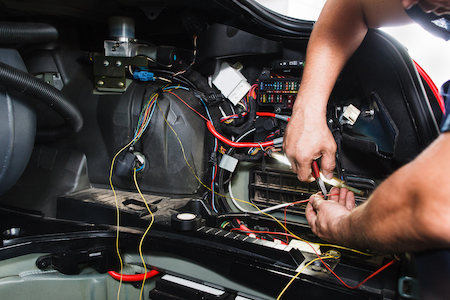Electricity and cars. When you hear these two words put together, it’s natural to think about the electric cars being sold by multiple manufacturers. It’s hard not to notice the infrastructure being built to allow more electric cars on the road.
But traditional vehicles that operate on gasoline have an electrical system too. Without the electrical system, your car would malfunction. It helps start the engine, without it, you would never be able to drive.
The electrical system consists of the battery, starter, and alternator. When you turn the key or press the button, the battery provides energy to the starter. This action gives power to the alternator, which in turn recharges the battery. If one of these parts isn’t working properly, your car won’t start or operate.
Car electrical issues will cause many problems that prevent you from driving your car. If you recognize these issues early, you can fix the problem before it leaves you stranded by the side of the road.
How do you recognize potential electrical system problems?
Like other systems, your electrical system will provide early warning signs that a potential issue is building. Notice the warning signs early, and you can bring your vehicle in for repair before the problem grows in severity. Have you noticed:
Car lights dimming – the electrical system powers the accessories you use each time you drive your vehicle. If you notice it’s harder to see while driving at night, it could be a sign of a failing battery.
Clicking sound when you turn the key – you can hear the starter trying to engage, but your vehicle has difficulty performing the function. There is insufficient power from the battery to start the vehicle.
Slow engine crank – you turn the key, and the engine is sluggish as it tries to engage.
Backfiring – when a battery is failing, it can send intermittent sparks out that can lead to excess fuel in the cylinders. This built-up fuel is ignited when it experiences increased force, which sends out a sound you can’t miss.
Burning smells – this is a sign of a short circuit. If the electrical system isn’t working properly, or has become disconnected in any way, it can cause heat to build and short out a circuit. Stop driving and bring it in for repairs.
A deeper understanding of electrical system components
The electrical system is made up of three components: the battery, starter, and alternator. Each performs a specific function in assuring your vehicle stays operational.
Battery
The power supply starts with the battery. Until your vehicle starts and is running, your battery provides all electrical current. That includes power to the ignition and fuel system, which create the combustion process necessary for the engine to start and operate.
Starter
While the battery supplies power, it’s the starter that gets the engine running. The battery is there to provide the necessary power to give the starter what it needs to turn over the motor. The starter is nothing more than an electric motor that engages when you turn the ignition from off to run. On the engine, a flywheel is attached to the end of the crankshaft. On the starter, a gear mechanism is designed to fit into grooves on a pinion gear. When the ignition is turned on, the starter is energized, it pushes a rod to engage with the pinion gear that connects with the flywheel. This turns the engine over, which adds air into the system to connect with the fuel supply. At the same time, electricity is pushed through the spark plugs, igniting the fuel in the chamber. When the engine turns over and moves into operational mode, the starter disengages, the rod retracts, and the gear moves away from the flywheel to avoid damage from the internal movement.
The starter can be difficult to detect when a problem arises. But if you have any trouble with the starting process, one of our mechanics can use any number of detection techniques to determine if the starter is drawing enough electricity.
Alternator
It’s the alternator’s job to keep the car running once the engine has been turned on. The alternator powers most of the car’s electronic components, including headlights, power windows, windshield wipers, heated seats, dashboard illumination, and the radio. The alternator supplies them with direct current power as well as keeps the battery charged while driving.
When the engine is operating, it powers a drive belt attached to a pulley. It’s the pulley system’s job to turn the alternator’s rotor shaft, which spins a set of magnets around a coil. This is what generates alternating current and channels it into the alternator’s rectifier. The rectifier converts alternating current into direct current, and controls the car’s electrical system. It’s rare that an alternator wears out, but it can from overuse, exposure to water, heat damage, or other wear and tear.
If you notice electrical issues, don’t delay getting mechanical advice. A thorough examination can get to the root of the problem, and ensure your vehicle is working well once again. Some of the common issues you’ll notice include:
- A dead battery
- Corroded battery cables
- Blown fuses
- Damaged or worn spark plugs
- A battery that no longer charges
- A worn starter
- A malfunctioning alternator
You can ignore the problem, but it won’t go away. Any symptoms you notice are a warning sign that something is wrong with the system. Fix it quickly, and you can stop the problem before it escalates.
Contact us if you’re having issues with your car’s electrical system. One of our mechanics will inspect the system and determine where the problem lies. We’ll offer you solutions and help you make the right choice to get you back on the road in no time.

